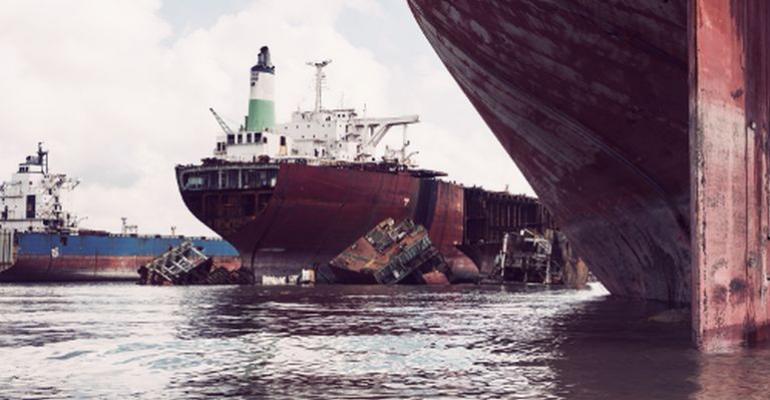Many facilities in India, Pakistan and Bangladesh fall short of compliance either with the IMO’s Hong Kong Convention (HKC) or the EU Ship Recycling Regulation, it said.
The consultancy has called on shipowners to undertake their own due diligence before disposing of ships for recycling, particularly at beaching yards in India, Pakistan and Bangladesh which handle most of the world’s end-of-life ships. For large vessels, including big tankers and bulkers, there are no other recycling options since China has now withdrawn from the sector and Turkish recycling yards do not have the capacity.
Sea Sentinels cited statistics for 2021 showing that South Asian yards dismantled 583 ocean-going and offshore ships out of a global total of 763. This was a notable increase on the 446-ships scrapped in South Asia in 2020.
But there is growing concern at the likely capacity squeeze on HKC-compliant yards. Only about a dozen facilities in India are believed to be certified under HKC requirements, having been audited by leading classification societies. However, no yards in either Pakistan or Bangladesh have been validated so far.
Meanwhile, the EU has not signed off yet on any South Asian facility. However, Sea Sentinels noted comments from Danish Shipping’s Maria Skipper Schwenn, executive director for Climate, Environment and Security, who said that two yards in Alang, India have received provisional EU approval, subject to improvement of external medical and waste management services already pledged by Gujarat state.
Sea Sentinels noted an example, cited by Schwenn, of a more proactive recycling strategy adopted by one of the world’s largest shipowners – Maersk. The company has implemented its own Responsible Ship Recycling Standard that exceeds HKC requirements, Schwenn revealed. Maersk has also worked with Alang yards to upgrade facilities and achieve the compliance necessary for dismantling projects to proceed.
However, the backdrop is daunting. The capacity squeeze is likely to tighten in the months ahead as elderly ships become subject to new regulations on carbon efficiency. Their owners will have the option of investing in upgrades on old assets for which there is an uncertain payback, or taking a lump of cash from a scrap sale.
Sea Sentinels’ chief executive, Rakesh Bhargava, summed up the situation: “The fact is, while these yards are still largely unregulated, there are few alternatives for shipowners due to a lack of available capacity at EU-compliant facilities for this volume of large vessels. So the onus is on owners to take responsibility for sustainable recycling at South Asian yards.”
Meanwhile, ship recycling prices remain buoyant in the world’s dismantling hotspot. From a brief lull early in January, prices have risen again, with typical prices for standard ships now above $600 per light displacement ton.
Copyright © 2024. All rights reserved. Seatrade, a trading name of Informa Markets (UK) Limited.
Add Seatrade Maritime News to your Google News feed.  |

